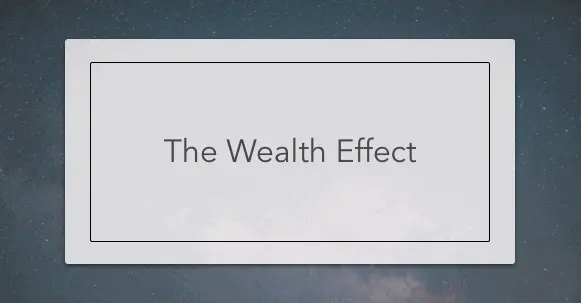
What is The Wealth Effect?
The wealth effect is a behavioral economic theory suggesting that individuals spend more as the value of their assets increase. The notion is that consumers feel more financially secure and confident about their wealth when their residences or investment portfolios increase in value. They are made to feel wealthier, even if their income and fixed costs are the same as before.
How The Wealth Effect Works
The wealth effect reflects the psychological influence that rising asset values, such as those that occur during a bull market, have on consumer spending behavior. The concept hones in on how the feelings of security, referred to as consumer confidence, are reinforced by substantial increases in the value of investment portfolios. Extra confidence contributes to higher levels of expenditure and lower levels of saving.
This theory can also be applied to enterprises. Companies tend to increase their hiring levels and capital expenditures (CapEx) in response to rising asset values, in a similar fashion to that observed on the consumer side.
What this means is economic growth should strengthen during bull markets—and erode in bear markets.
Special Considerations
At first inspection, the notion that the affluence effect promotes personal consumption makes sense. It is reasonable to presume that anyone resting on enormous gains from a house or stock portfolio would be more inclined to spend out on a costly holiday, new vehicle, or other discretionary items.
Nevertheless, critics claim that increasing asset wealth should have a much lesser impact on consumer spending than other factors, such as tax, household expenses, and employment trends. Why? Because a gain in the value of an investor’s portfolio does not truly equate to higher disposable income.
Initially, stock market advances must be considered unrealized. An unrealized gain is a profit that exists on paper, but that has yet to be sold in return for currency. The same applies to rocketing property prices.
Example of The Wealth Effect
:max_bytes(150000):strip_icc()/185121887-56a066503df78cafdaa16a14.jpg)
Proponents of the wealth effect can refer to several occasions when significant interest rate and tax increases during bull markets failed to put the brakes on consumer spending. Events in 1968 offer an excellent example.
Taxes were raised by 10%, yet people continued to spend more. Even though disposable income declined because of the additional tax burden, wealth continued to grow as the stock market persistently ascended higher.
Criticism of The Wealth Effect
Still, there is considerable debate among market commentators about whether or not the wealth effect truly exists, particularly within the context of the stock market. Some believe the effect has more to do with correlation and not causation, proposing that increased spending leads to asset appreciation, not the other way around. There is also a school of thought that promotes the Pigou Effect theory. Here, when prices decline, individuals acquire purchasing power and raise consumption rates, which leads to higher employment rates.
Read Also: Business Intelligence Tools for Small Businesses
Housing vs. Stock Market Wealth Effect
While it has yet to be definitively connected, there is more robust evidence linking increased expenditure to higher home values.
Economic luminaries Karl Case and Robert Shiller, the developers of the Case-Shiller home price indices, together with John Quigley set out to research the wealth effect theory by accumulating data from 1982 to 1999. The results, presented in a paper titled “Comparing Wealth Effects: the Stock Market versus the Housing Market,” found “at best weak evidence” of a stock market wealth effect, but firm evidence that variations in housing market wealth have significant effects upon consumption.1
The authors later extended their study of wealth and consumer expenditure in a panel of U.S. states to an expanded 37-year period, from 1975 to the second quarter of 2012. The results, published in January 2013, revealed that an increase in housing wealth, comparable to the rise between 2001 and 2005, would raise household expenditure by a total of about 4.3% over the four years. In contrast, a decline in housing wealth comparable to the collapse between 2005 and 2009 would cause an expenditure decrease of roughly 3.5%.2
Several other economists have supported claims that an increase in housing wealth encourages extra expenditure. However, others dispute these theories and claim that previous research on the topic has been overstated.






